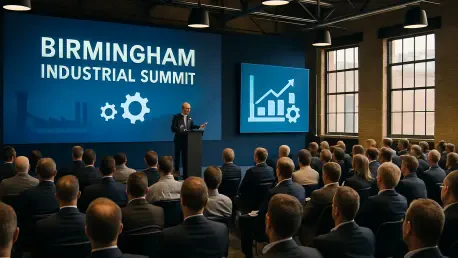In the heart of the West Midlands, Birmingham stands as a beacon of industrial might, contributing a staggering £10.4 billion annually to the UK economy through its manufacturing sector alone, and employing 211,000 individuals—representing 10.6% of local jobs compared to a national average of 7.8%. This impressive figure paints a picture of a powerhouse ready to redefine global industry standards. As the city hosts the inaugural MAINSTREAM UK Summit on October 21 at the iconic Millennium Point, it welcomes over 300 global leaders from manufacturing, utilities, transport, and oil and gas. This event marks a pivotal moment, positioning Birmingham not just as a historic “Workshop of the World” but as a modern hub for innovation and collaboration. The analysis that follows delves into how this summit shapes market trends, influences industrial strategies, and forecasts the region’s trajectory in a competitive global landscape.
Deep Dive into Market Dynamics and Industrial Trends
Economic Foundations: Birmingham’s Manufacturing Dominance
Birmingham and the wider West Midlands region anchor the UK’s largest manufacturing cluster, a critical driver of national productivity. Home to industry giants like Jaguar Land Rover, Aston Martin, and Collins Aerospace, the area excels in automotive, aerospace, and rail sectors, creating a robust ecosystem for high-skill employment and technological advancement. Recent data highlights consistent growth in these sectors, with investments in sustainable practices gaining momentum. However, challenges persist, such as balancing industrial expansion with environmental targets—a tension that shapes market behavior and demands innovative solutions. The MAINSTREAM UK Summit serves as a catalyst, spotlighting these economic strengths while addressing gaps through global dialogue.
Summit as a Market Influencer: Driving Innovation and Collaboration
Hosting the MAINSTREAM UK Summit amplifies Birmingham’s role in shaping industrial markets by fostering cross-border knowledge exchange. With speakers from globally recognized entities like NASA, Toyota, and Airbus, alongside UK leaders from Bentley Motors and BMW, the event tackles pressing themes like decarbonization, digital transformation, and workforce development. These discussions are poised to influence market trends, particularly in the adoption of AI-driven manufacturing processes and green technologies. The exhibition of 33 partners further enhances market visibility for cutting-edge solutions, creating opportunities for smaller firms to integrate into larger supply chains. This convergence of ideas and resources is expected to accelerate innovation cycles across multiple sectors.
Regional Competitiveness: Positioning in a Global Context
The strategic win of hosting this summit elevates Birmingham’s competitiveness on an international scale, distinguishing it from previous MAINSTREAM host cities like Perth and Melbourne. Unlike other regions where industrial focus might lean heavily on raw material extraction, the West Midlands emphasizes sustainability and advanced manufacturing, aligning with global shifts toward eco-conscious practices. Market analysis suggests this positioning could attract foreign direct investment, particularly in robotics and life sciences technology, over the next few years. Yet, overcoming outdated perceptions of Birmingham as merely a historic industrial city remains crucial to fully capitalizing on this global exposure. The summit offers a platform to reshape narratives and solidify market confidence.
Forecasting Industry Shifts: Opportunities and Challenges Ahead
Emerging Trends: Sustainability and Digital Integration
Looking at current market patterns, the push toward sustainability and digital integration stands out as a defining trend for industries represented at the summit. Decarbonization strategies are no longer optional but essential, with potential regulatory changes like stricter emissions standards looming on the horizon from now to 2027. Digital transformation, particularly through AI and automation, is reshaping production efficiencies, offering cost reductions but requiring significant upskilling of workforces. Birmingham’s hosting of this event places it at the forefront of these shifts, potentially setting benchmarks for how regional markets adapt to global demands. The insights shared during workshops and case studies are likely to inform strategic planning for numerous companies.
Market Projections: Long-Term Economic Impact
Projections indicate that the ripple effects of the summit could bolster the West Midlands’ economy by fostering long-term collaborations and innovation hubs. Increased networking among global leaders may lead to joint ventures in high-growth areas like industrial machinery and aerospace, with economic reports forecasting a potential 5-7% uptick in regional investment over the next few years. However, risks such as logistical challenges in scaling up infrastructure to support new projects could temper this growth. Market stakeholders must prioritize addressing skill gaps to meet the demands of emerging technologies, ensuring the region remains a competitive player in the global arena.
Strategic Implications: Navigating Competitive Pressures
The summit’s focus on critical industry issues offers a roadmap for navigating competitive pressures in a rapidly evolving market. For instance, the emphasis on workforce development highlights the need for tailored training programs to bridge existing skill shortages, a concern for many manufacturing firms. Additionally, the push for sustainable practices could pressure companies to adopt greener technologies sooner than planned, impacting short-term profitability but enhancing long-term market positioning. Birmingham’s ability to leverage this event for policy advocacy—potentially influencing national incentives for green tech—could further strengthen its market standing, setting a precedent for other industrial regions.
Reflecting on the Summit’s Legacy: Strategic Pathways Forward
Looking back, the MAINSTREAM UK Summit in Birmingham marked a historic milestone that showcased the West Midlands’ industrial prowess and innovative spirit to a global audience. The event’s success in uniting over 300 leaders from diverse sectors underscored the region’s potential as a leader in manufacturing and technology. Moving forward, businesses were encouraged to build on the connections forged during the summit by pursuing partnerships that drive digital and sustainable advancements. Policymakers, on the other hand, gained a unique opportunity to craft supportive frameworks based on the actionable insights shared, particularly around workforce training and environmental goals. Ultimately, the lasting impact of this gathering lay in its ability to inspire a collective commitment to innovation, urging all stakeholders to invest in strategies that would sustain Birmingham’s competitive edge for years to come.









